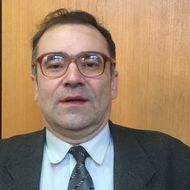- A
- A
- A
- ABC
- ABC
- ABC
- А
- А
- А
- А
- А
- HSE University
- Faculties
- Faculty of World Economy and International Affairs
- School of World Economy
- News
- US Investment Banks: More Regulation – Less Stress
-
The School
17/1 Malaya Ordynka Str., Moscow, 119017
Phone: +7(495)772-95-90*22237
Email: wec@hse.ru
 The Multilateralism of the New Development Bank on the Sustainable Economic Growth in BRICS Nations and Beyond
The Multilateralism of the New Development Bank on the Sustainable Economic Growth in BRICS Nations and Beyond
Morozkina A., Grigoryev L. M., Gaspardo M. et al.
Emerald Group Publishing Ltd., 2025.
Frontiers in Political Science. 2025. Vol. 7.
Leonid Grigoryev, Morozkina A.
In bk.: The Multilateralism of the New Development Bank on the Sustainable Economic Growth in BRICS Nations and Beyond. Emerald Group Publishing Ltd., 2025. Ch. 6. P. 83-101.
Yakovlev A. A., Freinkman L., Ershova N. V. et al.
QoG Working Paper Series. 2023:19. University of Gothenburg, 2023. No. 19.

US Investment Banks: More Regulation – Less Stress
Leading U.S. investment banks were perhaps the most affected by the 2007–2009 global economic meltdown and, therefore, were immediately brought into supervisory mechanism. Regulatory coverage of investment banks was also urged by the demise of Lehman Brothers, one of the largest global investment banking institutes, as well as by dysfunction of a number of other key players in the global financial markets. Prudential regulatory regime that was extended over the U.S. investment banking segment would have to fill the time gap between banking services innovation and the subsequent calibration of the regulatory policy. Besides, because of the global reach of U.S. investment banks the Financial Stability Board (FSB) categorized them as global systemically important banks (G-SIBs), which means that they are in the frontlines of the banking industry in mitigation of systemic risks and they bear higher responsibility in ensuring their stress resilience amid the more stringent post-crisis standards of banking regulation, including additional buffers to banking capital. In other words, the investment banking business in the U.S., like the activity of the commercial banks, was assigned by financial regulators with the objective of financial stability.
The contemporary model of international banking regulation equally acknowledges both investment and commercial banks in their contribution to systemic risks. In the U.S. regulatory system, stress resilient financial intermediation is a cornerstone of the Dodd–Frank Act of 2010, which along with the Basel Principles for Effective Banking Supervision should help achieve the synergetic effect of the post-crisis regulatory reform. This could be feasible through the enhanced market discipline of U.S. investment banks.
To find out whether performance of U.S. investment banks depends on the post-crisis regulatory standards, the authors applied a regression analysis, which showed that the investment banks’ ROE does not depend on the Basel III standards; however, Higher Loss Absorbency (HLA) requirements have a negative effect on ROE in the post-crisis period depending on the G-SIB’s bucket according to the FSB methodology. Moreover, ROE also depends on leverage ratio, subject to the G-SIB’s bucket. The findings also show that U.S. investment banks became more risk averse in their activity, despite some decline in their key performance indicators.
Eduard P. Dzhagityan
- About
- About
- Key Figures & Facts
- Sustainability at HSE University
- Faculties & Departments
- International Partnerships
- Faculty & Staff
- HSE Buildings
- HSE University for Persons with Disabilities
- Public Enquiries
- Studies
- Admissions
- Programme Catalogue
- Undergraduate
- Graduate
- Exchange Programmes
- Summer Schools
- Semester in Moscow
- Business Internship
- © HSE University 1993–2025 Contacts Copyright Privacy Policy Site Map
- Edit







